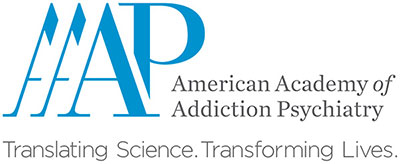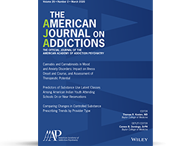
When: September 12-13, 2025
Registration TBD
Join us for a two-day live course that features expert presentations and interactive discussions on the latest advancements and trends in addiction. The course has 15 topics, each with a comprehensive 45-minute presentation followed by a 15-minute Q&A session. The live course will cover diverse topics relevant to Addiction Psychiatry and is particularly useful for those preparing for ABPN certification and recertification examinations. Participants will also have access to a 25-question self-assessment exam.
Participants will have access to an additional 15 on-demand sessions to further enrich the learning experience.
Don’t miss this opportunity to deepen your knowledge, engage with leading experts, and advance your expertise in addiction.
The field of Addiction changes frequently as new information becomes available. This course presents a broad-based overview of addictions and up-to-date information in the field of addiction. It is recommended for physicians, PA-Cs, nurse practitioners, and other professionals who wish to stay updated on the most recent trends in the addiction field. It is equally relevant to junior faculty and clinicians as well as experienced practitioners and is intended to help psychiatrists prepare for ABPN certification and recertification examinations in Addiction Psychiatry.
At the conclusion of this activity, participants should be able to:
- Describe new advances in pharmacotherapy and psychotherapy of substance use disorders.
- Discuss the epidemiology of substance use disorders and their co-occurrence with other psychiatric conditions and review current recommended approaches for concurrent treatment of substance use disorders and other conditions.
- Describe the role of genetics in the risk for developing substance use disorders.
- Identify the major neurobiological pathways involved in substance use disorders.
- Identify the molecular mechanisms that are altered following substance use disorder.
- Review strategies for screening, brief intervention, and referral to treatment in the context of motivational interviewing.
- Review current treatment guidelines and how to utilize them in clinical practice.
- Describe special considerations for substance use disorder diagnosis and treatment for women, underrepresented racial and ethnic minorities, youth, older adults, hospitalized patients, and patients with comorbid health conditions.
|
Topic |
Faculty |
|
Live Sessions |
|
|
Behavioral Addictions |
Timothy W. Fong, MD |
|
Co-Morbidity of Substance and other Psychiatric Disorders |
Edward V. Nunes, MD |
|
Party Drugs |
Petros Levounis, MD, MA |
|
Access in Addiction Treatment for Special Populations |
Adina Bowe, MD |
|
Pain and Addiction |
Roger Chou, MD |
|
Pregnancy and Substance Use Disorders |
Michelle Lofwall, MD |
| Substance Uder Disorders in the Older Population |
Louis Trevisan, MD |
|
Youth and Substance Use Disorders and Attention Deficit Hyperactivity Disorder |
Amy M. Yule, MD |
|
Sex and Drugs Gender Differences in Substance Use Disorder |
Kathleen T. Brady, MD, PhD |
|
Suicide and Substance Use Disorders |
Richard Ries, MD |
|
Integrative Care |
Sanchi Maruti, MD |
|
Hot Topics |
|
|
On Demand Sessions |
|
|
Alcohol |
David Marcovitz, MD |
|
Cannabis |
Petros Levounis, MD, MA |
|
Benzodiazepines: The Hidden Epidemic |
Richard K. Ries, MD |
|
Forensic Issues in Addiction |
Laurence M. Westreich, MD |
|
General Concepts and Epidemiology |
Kevin A. Sevarino, MD, PhD |
|
Medical Comorbidities in Patients with Substance Use Disorders |
Steven L. Batki, MD |
|
Motivational Interviewing |
Carla Marienfeld, MD |
|
Naloxone Overdose Training |
Michelle Lofwall, MD |
|
Neurobiology and Genetics |
Kevin A. Sevarino, MD, PhD |
|
Psychosocial Treatments of the Addictions |
Edward V. Nunes, MD |
|
Review of Opioids and Treatment of Opioid Use Disorders |
John A. Renner, Jr., MD |
|
Stimulant-Related Disorders |
Steven L. Batki, MD |
|
Substance Use Disorder in Hospital Settings |
Sanchi Maruti, MD |
|
Tobacco and Nicotine |
Jill Williams, MD |
|
Urine Drug Testing |
Kevin A. Sevarino, MD, PhD |
Note: You can find previously recorded courses on the Educational Opportunities page.



